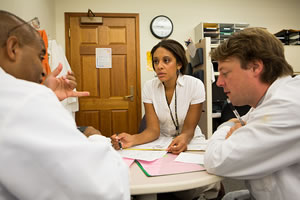Your Appointment with the Cancer Genetics Clinic
Genetic consultations are with a genetic counselor and a physician specializing in cancer genetics. The counselor and physician will begin by reviewing the information provided about family and medical history. This can help determine the risk of inherited cancers and point to which types of cancer are a concern.

The visit will also include a physical examination to check for rare conditions that may be linked to a higher cancer risk - for example, a large head could be due to a condition tied to breast and thyroid cancer, or some skin conditions may indicate a syndrome associated with colon cancer risk.
The counselor and physician will discuss genetic testing options for you and your family. In some cases, it may make more sense for another family member to be tested first. A genetic test is typically done by drawing a vial of blood and sending it to a laboratory for analysis. Genetic testing looks for changes within the genes called "mutations" that can cause problems in how these genes function. Results are usually returned several weeks later. Your genetic counselor will discuss the results with you and the team will formulate a plan for you and your family based on the genetic test results and the family assessment.
What do test results mean?
A positive test result means the person has inherited a genetic mutation associated with an increase in cancer risk. This means a higher risk of developing the affiliated type of cancer. It does not mean the person WILL develop cancer.
A negative test means that a mutation was not found in the genes tested. This does not mean the person will NOT develop cancer. Not all genes involved with cancer are known, and the majority of cancers are sporadic, or random.
There is a third possible result, called a variant of uncertain significance, or VUS. This means that a change was found in the gene analyzed, but it is not clear if the specific gene change is associated with a higher risk of cancer. These results are typically uncommon. It is very important to discuss these (and all) genetic test results with a health professional who is knowledgeable about genetic testing.
What happens if I test positive?
- Additional cancer screening or beginning screening at a younger age
- Lifestyle changes, such as increasing exercise, making dietary changes or stopping smoking
- Regular CT scans, MRI's or blood work
- Preventive surgeries to remove high-risk organs before they have a chance to develop a cancer
- More aggressive treatment if you have already been diagnosed with cancer
A positive genetic test does not mean that you have cancer. It means you are at higher risk of developing cancer. Our genetic counselors and geneticists will formulate a plan to help you reduce that risk. This may include:
All care is coordinated by the Cancer Genetics Clinic and integrated into the rest of your medical care. In some cases, we may also suggest consultations with additional family members to better understand risk for the entire family.
What if I choose not to be tested?
If you choose not to have genetic testing, we will work with you to understand your cancer risk and help you formulate a plan to reduce your risk based on your personal and family medical history.
